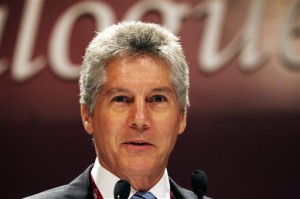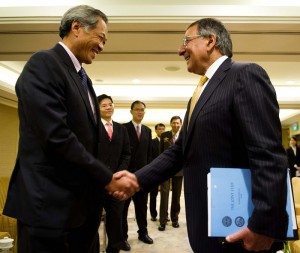
Australia's Defense Minister Stephen Smith delivers a speech about “Deterrence and Regional Stability” at the Institute for Strategic Studies Shangri-la Security Summit on Saturday June 2, 2012, in Singapore. Smith on Sunday welcomed the United States' plans for an enhanced naval presence in the Pacific. AP PHOTO/WONG MAYE-E
SYDNEY—Australian Defense Minister Stephen Smith on Sunday welcomed the United States’ plans for an enhanced naval presence in the Pacific, and said this should not impact Canberra’s relationship with China.
Pentagon chief Leon Panetta announced in Singapore on Saturday that the United States will shift the bulk of its naval fleet to the Pacific by 2020 as part of a new strategic focus on Asia.
Smith, speaking shortly after his return from Singapore, said the United States’ presence in the Asia Pacific had been “a force for peace and stability and prosperity since the end of World War II.”
“And we welcome very much the fact that not only will the United States continue that engagement, it will enhance it,” he told the Australian Broadcasting Corporation.
“The essential point is that none of this is done for reasons of trying to maximize or influence concern or threat; it’s all done for purposes of stability to continue peace, to continue prosperity.”
Panetta said the decision to gradually deploy more ships to the Pacific, along with expanding a network of military partnerships, was part of a deliberate effort to bolster the US role in an area vital to America’s future.
The move reflects US concern over China’s rising economic and military might but Panetta insisted the strategy was not a challenge to Beijing.
Australia will see 2,500 US Marines deployed to its north as part of the Asia strategy, a move that has rankled Beijing, but Smith said when he traveled to China this week he would make clear that Canberra wanted to continue to deepen its relationship with the Asian giant.
“The point I’ll make to Chinese friends is that Australia has had a growing relationship with China since we were one of the countries to recognize China very early back in 1972; we’ve had a growing relationship for 40 years,” he said.
He added that Australia had a strong and comprehensive relationship with key trading partner China and growing defense ties.
“And none of that has been adversely affected by our over 60-year alliance with the United States, he said.
“So this is … it can be win-win, and that’s what we want it to be. We can have a positive, constructive and comprehensive relationship with China, and at the same time continue an alliance with the United States which has served Australia well for over 60 years.”


